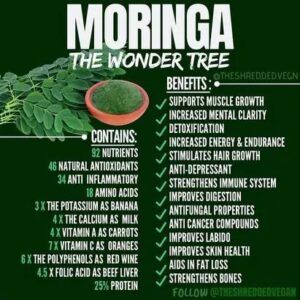What is IT?
Moringa (Moringa oleifera), often called the “miracle tree” or “drumstick tree,” is a nutrient-dense plant native to India and Africa. Nearly every part of the tree—leaves, seeds, pods, and oil—is edible or medicinal. For centuries, it’s been used in Ayurvedic medicine to treat inflammation, fatigue, and digestive issues. Today, it’s a rising star in the superfood world, praised for its unparalleled nutritional profile and versatility.

Moringa Plant
Moringa’s Nutrient Advantage: Why It Beats Other Superfoods
Moringa is a nutritional powerhouse, outshining popular superfoods like kale, spinach, and matcha:
Nutrient – Moringa (Per 100g) – Comparison
Vitamin C – 157% DV – 7x more than oranges 🍊
Iron – 32% DV – 3x more than spinach 🥬
Calcium – 19% DV – 4x more than cow’s milk 🥛
Protein – 9.4g – 2x more than kale 🥬
Antioxidants – High ORAC score – Rivals blueberries & turmeric
Key Takeaway: Moringa provides 92 essential nutrients, making it ideal for vegans, athletes, and anyone seeking natural energy and immunity boosts.
How to Use Moringa: 5 Forms and Their Benefits
- Moringa Powder
- Use: Mix 1 tsp into smoothies, soups, or oatmeal.
- Recommended: Kuli Kul Moringa Powder
- Best For: Daily nutrition and gut health support.
- Moringa Capsules
- Use: Take 1-2 capsules daily with meals.
- Recommended: Moringa Magic.
- Best For: Busy lifestyles.
- Moringa Oil
- Use: Apply topically for glowing skin or mix with carrier oils for hair care.
- Recommended: Majestic Pure Moringa Oil.
- Best For: Anti-aging and acne-prone skin.
- Moringa Seeds
- Use: Eat raw (peel the husk) or plant to grow your own tree.
- Best For: Detoxification and sustainable living.
- Moringa Tea
- Use: Steep dried leaves in hot water for 5 minutes.
- Recommended: Traditional Medicals Moringa Tea

Moringa for Gut Health: How It Supports Digestion
Moringa isn’t just a superfood—it’s a gut-healing ally:
- Rich in Fiber: Aids digestion and prevents constipation (1 tsp powder = 2g fiber).
- Anti-Inflammatory: Reduces gut inflammation linked to IBS or leaky gut.
- Prebiotic Properties: Feeds good gut bacteria, enhancing probiotic effectiveness.
Pro Tip: Pair moringa with probiotics for a gut-health power duo:
- Add 1 tsp moringa powder to probiotic-rich foods like yogurt or kefir.
- Seed DS-01 Synbiotic for a combined prebiotic + probiotic solution.
Beyond the Gut: 5 Surprising Health Benefits of Moringa
- Natural Energy Boost
- Moringa’s iron and B vitamins combat fatigue without caffeine crashes.
- Glowing Skin & Hair
- Moringa oil’s antioxidants fight acne and reduce wrinkles. Try this DIY mask:
*Mix 1 tbsp moringa powder + 1 tbsp honey. Apply for 15 minutes. *
- Moringa oil’s antioxidants fight acne and reduce wrinkles. Try this DIY mask:
- Weight Management
- Its fiber and chlorogenic acid help regulate blood sugar and curb cravings.
- Immune Support
- Vitamin C and zinc levels strengthen immunity—ideal for cold/flu season.
- Hormonal Balance
- Studies suggest moringa may stabilize cortisol and support thyroid health.
Moringa Side Effects: What to Watch For
While generally safe, moringa may cause:
- Digestive discomfort if overconsumed (start with ½ tsp daily).
- Interactions with blood thinners (consult a doctor if on medication).
- Uterine contractions (avoid during pregnancy).
How to Incorporate Moringa into Your Routine
- Morning Ritual: Blend moringa powder into a green smoothie with spinach and banana.
- Skincare: Add 2 drops of moringa oil to your moisturizer.
- Meal Boost: Sprinkle moringa on soups, salads, or avocado toast.
Conclusion: Why Moringa Belongs in Your Wellness Routine
Moringa is more than a trend—it’s a sustainable, nutrient-packed superfood with benefits for your gut, skin, and overall vitality. By gaining knowledge about its uses and pairing it with probiotics (like Seed Synbiotic), regular use will create invaluable benefits for your health and your looks.
“Ready to try moringa?
Grab my top-rated picks: Moringa Capsules [here]!”*
Moringa Oil [here] Moringa Powder [here]
“Here is a little transparency: Our website contains affiliate links. This means if you make a purchase, we may receive a small commission. Don’t worry, there is no extra cost to you. It’s a simple way you can support our mission to bring you quality content”

This was such an informative post—thank you! I’m really intrigued by all the benefits of moringa, especially its impact on gut health and skin. I had no idea it offered more vitamin C than oranges or worked as a natural prebiotic.
Quick question: If someone is just starting out with moringa, do you recommend beginning with the powder, capsules, or tea for the best balance of convenience and health benefits? Also, is it more effective when paired with probiotics, or can it still make a noticeable difference on its own?
Hi Jason,
Thanks so much for your thoughtful comment—I’m glad the post sparked your interest in moringa! It’s one of those superfoods that really delivers on multiple fronts, and it’s great to hear you’re exploring it with digestion and energy in mind.
For those just starting out, both powder and capsules can be effective, but I personally prefer the capsule form. It’s more convenient for daily use and allows for consistent dosing without the strong earthy taste that the powder sometimes carries. That said, if someone enjoys blending smoothies or cooking with superfoods, the powder can be a versatile addition.
As for timing, taking moringa in the morning or early afternoon works well for most people. It pairs nicely with breakfast or lunch and can help support energy and digestion during the day. Since moringa also contains a mild natural stimulant effect, it’s best to avoid taking it late in the evening.
If you’d like help choosing a high-quality moringa product or tips on pairing it with other gut-friendly nutrients, I’d be happy to share more. Wishing you an energizing start with this powerful plant!
Regards
Oren
Hi Oren,
Thanks for sharing this informative piece on moringa! It’s fascinating to learn about the incredible nutrient density and versatility of this superfood. I particularly liked how you broke down the various forms of moringa and their specific benefits. The gut health section was especially insightful, highlighting moringa’s potential as a prebiotic and anti-inflammatory agent.
I’m curious, have you personally incorporated moringa into your wellness routine? If so, what has been your favourite way to use it, and have you noticed any positive effects on your overall health?
Looking forward to hearing your thoughts!
All the Best,
Eric
Hi Eric,
Thanks so much for your kind words—I’m really glad the breakdown of moringa’s benefits resonated with you! It’s one of those rare superfoods that bridges nutrition and healing in such a compelling way, especially when it comes to gut health and inflammation.
As for my own routine, yes—I’ve definitely made moringa part of my wellness practice. I personally prefer the capsule form. It’s convenient, especially for consistent daily use, and makes it easier to control the dosage. I’ve noticed subtle but meaningful improvements in digestion and energy over time. Plus, it’s a great complement to probiotics in terms of supporting microbiome balance.
If you’re exploring ways to use moringa yourself, I’d be happy to share more tips or help you tailor it to your health goals. Thanks again for engaging so thoughtfully!
Regards
Oren